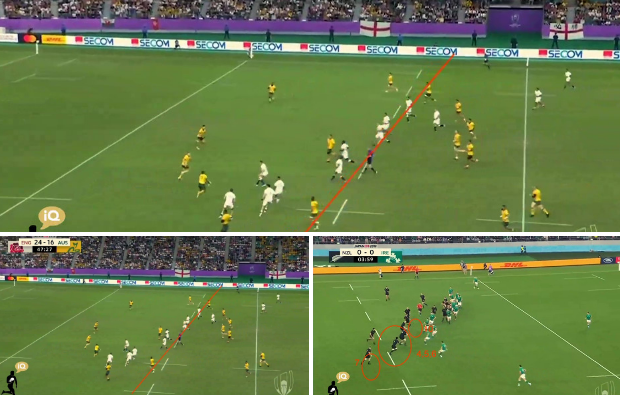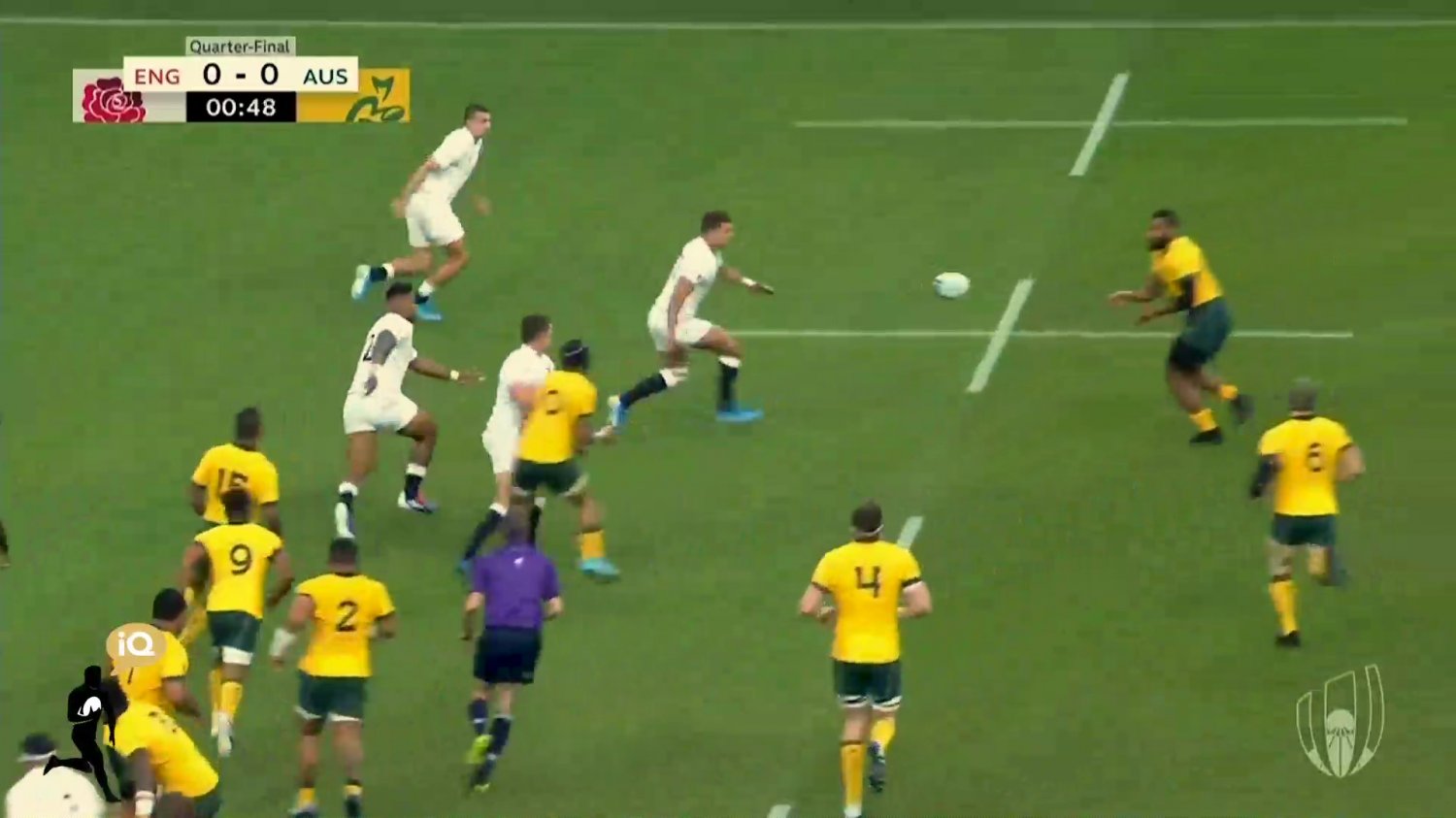EXCLUSIVE: Omar Mouneimne takes a look at England and New Zealand's attacking and defensive structures
- 5812

England and New Zealand clash in the Rugby World Cup semi-final in Yokohama on Saturday and once again professional defence coach Omar Mouneimne takes a look at the two sides attack and defence.
In the clip below Omar takes a look at the two side's attacking and defensive patterns throughout this Rugby World Cup.
First up, we take a look at how quickly England set up for the lineout and don't allow Australia to get in and out of the lineout quickly.
This allows England to have their defence line set and slow down or stop any attack from the Australians. Although England don't make dominant tackles in this phase of play, their line speed prevents Australia from gaining metres.
England's excellent line speed causes Australia to track back and eventually kick.

Next up we have a quick look at England's excellent chasing game from Ben Young's box kick. Tom Curry does well to call Kyle Sinckler over to the other side of the ruck so that they have an even chase on both sides of the ruck.
From there it's all about the chase, and England go full tilt! The chase is excellent as they catch Matt Toomua ball and all.
They also follow that up with an excellent line speed from the resulting rucking putting Australia on the back foot and catching them behind the advantage line.
It's not just from box kicks that England's chasing line is superb.
See in the next clip below how they cleverly shift the ball onto the left-footed Henry Slade, who has a better clearing angle than Farrell, from the restart.
From there Slade clears and England 'race chase' and catch Australia near their own 10m line. The counter ruck from England puts Australia under pressure and Genia becomes a bit lost before slinging it out to Sio, who is held up Vunipola and George some 50 metres away from where Slade cleared it from the restart.
Moving onto England's attack and throughout the game against Australia, England had multiple ball carrying options. Straight from the lineout, Youngs has three options in Vunipola, Farrell and Tuilagi with Tuilagi getting the ball on this occassion. This type of set up makes it difficult for the defence as they must shoot up and make a decision early.

England get lightening quick ball from the breakdown and on the next phase and Slade takes it hard to line before giving it out the back to Curry as it goes out to Daly who puts Watson away down the flank.
England will only use the above attacking play if they have momentum but they do get the opportunity, they capitalise on it. The very next phase, each ball carrier has options as they go behind the forwards backs as they go coast to coast as May goes over in the corner.
Now this is where England's attack may have the edge over the All Blacks as they vary their attack really well as the forwards give it out the back to Farrell and Farrell continues to follow the play, picking the right options giving Watson some space out wide.
Australia's defensive line has to continuingly respect the fact that any play could get the ball and eventually they pick the wrong receiver and Farrell picks out Sinckler with a brilliant pass to send the prop through from a really well organised and patient attack.
Moving on to the All Blacks...
The All Blacks' attack against Ireland looked slightly less sophisticated. Barrett or Mo'unga will often hit Read in the midfield, with Read having the ability to tip it on, but in this case he gets caught ball and all.
England's exceptional line speed mentioned above will make it difficult for the All Blacks if they don't improve their hardlines and sharpness on attack. They had simple pod play against Ireland and did tip the ball on but I don't believe their attack is as sophisticated as England's.
Here the All Blacks start running out of ideas on attack, something that happens quite often to them, and Ireland read it well to put them under pressure. This is another area where England could gain the upper hand.

From here the All Blacks attack the opposite way after struggling to gain ground on the short side before Sonny Bill Williams is brought down and Barrett eventually grubbers it through.
Where New Zealand could hurt England, if they aren't aware enough to it is their attacking kicking game. In the clip below, the All Blacks use an old Springbok tactic and kick from a scrum inside Ireland's half. They manage to regather it and get it out wide where they gain some ground.
The All Blacks used a similar tactic again from the lineout, this time getting the ball to Mo'unga in the middle of the pitch. He cross kicks to Bridge, in order to combat Ireland's rush defence from set pieces and Ireland are immediately on the back foot. They quickly recycle the ball and get it out to Mo'unga who has a few forward running options. He picks Retallick who gives a lovely tip pass to Read as the All Blacks go in behind the defence.
Henry Slade could cause the All Blacks a few problems off the bench after starring against Australia. As you will see in the next clip, England are patient on defence with Slade bursting up to snuff out promising attacks.

He reads the attack perfectly to intercept and hacks the ball upfield eventually resulting in a try.
Taking a look at the All Blacks defence, we can see that they too have great speed off the line. They are nice and square and the fold smoothly to cover threats and come off the line nice and hard.
Like England's defence, this causes errors from the opposition and they too capitalize. Showing that both defences have the ability to fly off the line, hit you ball and all and getting turnovers and scoring.
In summary, both teams are capable of unlocking defences and scoring tries. The All Blacks are more focused individual brilliance with good offloads while still running good shape and are particularly dangerous on the turnover attack.
Where the English have a more structured attack and use their pressure kicking game.
















